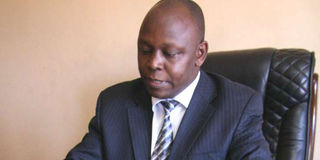Premium
Lawyer Paul Gicheru ‘was ready to spill beans’ before he surrendered

Advocate Paul Gicheru who is wanted by the International Criminal Court for allegedly interfering with witnesses.
What you need to know:
- The Eldoret-based lawyer had for five years dodged authorities in the Netherlands.
- Mr Gicheru is said to be part of those used by the DP and his team to interfere with evidence and witnesses through intimidation and bribery.
For close to three weeks, the Nation had been seeking an interview with Mr Paul Gicheru, who surrendered to the International Criminal Court in the Netherlands on Monday.
The purpose of the interview was to get the lawyer’s account on his life as an ICC fugitive.
The Eldoret-based lawyer had for five years dodged authorities in the Netherlands, who accused him of interfering with witnesses in the case against Deputy President William Ruto and radio journalist Joshua arap Sang.
Getting the lawyer was no mean feat. Most of the phone numbers we called – and which the Nation was told were Mr Gicheru’s, failed to go through. Some, we were out of service.
After a number of attempts, we finally got a hold of the advocate. A soft-spoken man even on phone, the Mr Gicheru informed us that he had resolved to let the ICC matter rest, arguing that most of the things we wanted to talk about have been overtaken by time.
“My friend, sometimes it is important to let things of the past remain in the past. It is important to move on,” he said.
But I insisted, arguing that the story we were pursuing was important. I told Mr Gicheru that while his decision to let go was significant, it was also important for Kenyans to know how his life has been.
The Nation wanted to talk to him for a number of reasons. Whereas those that the lawyer was accused of assisting, like Dr Ruto, had resumed normal lives – running government for close to seven years and even planning a stab at the Presidency – he was still a fugitive.
Dr Ruto’s case was terminated for lack of evidence. Mr Gicheru is said to be part of those used by the DP and his team to interfere with evidence and witnesses through intimidation and bribery.
We told the lawyer that it would be important for him to tell what it felt like when a warrant of arrest was issued against him by the ICC. How did he react? Did he lose friends? What of the people in position of power from who he is said to have enjoyed protection? Were they still in touch?
We also wanted to know how the case had changed his lifestyle, how his international travel had been affected, whether he makes prior arrangements before visiting countries that are members of the ICC, or whether he leaves Kenya at all.
Surrendered
Mr Gicheru was initially reluctant, still insisting that he would not offer much, save from the information already in the public domain.
“I think that it is important to let the public know what life has been. May be we should talk. Do you want to do it as an interview?” he asked.
We were thinking of a one-on-one interview. The sooner we did it the better.
His argument, however, was that last week would not be possible, and that for a better story, we should visit him this week.
“You give me a call on Thursday. We can arrange so that you come to my office in Upper Hill,” he said.
That was on Friday, three days before news broke that Mr Gicheru had surrendered to authorities in the Netherlands.
The lawyer struck me as having been willing to open up after years in the shadows even as he served as chairman of the Public Procurement Regulatory Authority.
Throughout our conversation which lasted close to five minutes, Mr Gicheru said little, allowing me to explain why I was interested in the interview.
We tried reaching out to Mr Gicheru on Monday, when the ICC said he had surrendered, but his phone was off.
Mr Gicheru had been on the run after The Hague-based court called for his arrest in 2015. It accused him of interfering with witnesses in the 2007/08 post-election violence cases.
Prosecutors accused the lawyer of blocking the administration of justice by corruptly influencing witnesses, an offence he is said to have committed alongside Mr Philip Kipkoech Bett and former journalist Walter Barasa.




